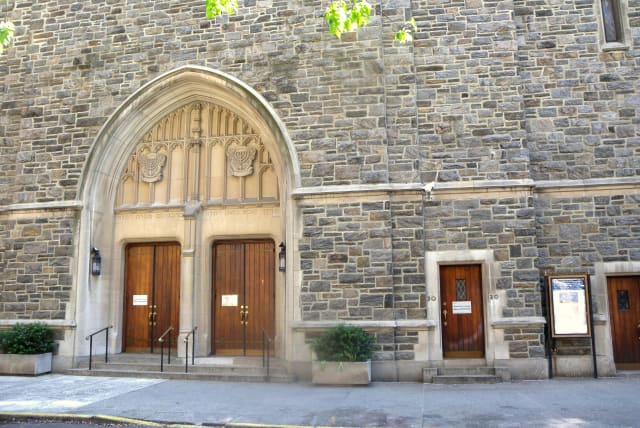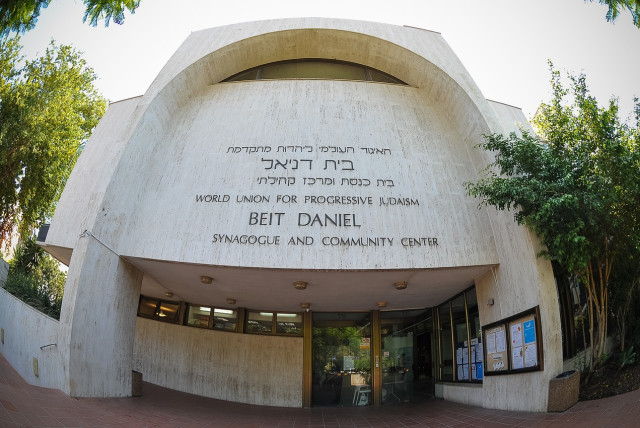Reform rabbis gather for NYC conference to cement Reform Jewish values

Reform Judaism conference in New York addresses issues of Jewish Peoplehood, Zionism and the disappearance of conversion ceremonies in the movement
Hundreds of Reform Jewish clergy, educators, synagogue presidents and board members were set to arrive at Stephen Wise Free Synagogue, a historic 116-year-old Reform congregation on New York’s Upper West Side on Wednesday for a two-day conference today. This first-of-its-kind forum will address the central challenges facing the North American Reform movement and will attempt to “reestablish central Reform values of Jewish peoplehood and Zionism that have weakened in recent years and address other pressing issues,” the synagogue said.
Titled “Re-CHARGING Reform Judaism,” it was initiated by senior SWFS Rabbi Ammiel Hirsch, who has been what some consider the “opposition” in the American Reform Movement (the Union of Reform Judaism – URJ), in terms of its relationship with Zionism, Israel and with tradition. In previous interviews, Hirsch has insisted that he actually represents the mainstream of Reform congregations on these issues.
This conference, planned months in advance by one prominent rabbi, but not by the umbrella organization, will deal with the most sensitive core issues in the Reform movement, among them “the growing distance between North American Liberal Jews and Israel, and their fraying connection with the concept of Jewish peoplehood,” as well as other topics like “rooting justice and Tikkun Olam [repairing the world] efforts in Jewish particularism and tradition; Re-charging religious language and ritual practice as core to Reform Judaism and prioritizing Reform Jewish education.”
Hirsch said he believes that “the Jewish community and the Reform movement in particular are at a historic crossroads. Amid the latest disturbing developments in Israel after its most recent election and the pre-existing increasing distancing from Israel within our own ranks, it is incumbent upon us as leaders to address in a meaningful way the communal challenges that are tearing at the ideological and theological foundations of our movement’s connections to the Jewish people and Jewish state.”
ONE OF the rabbis who assisted Hirsch with this conference – although he won’t be able to participate physically – is Rabbi Meir Azari, senior rabbi of the Beit Daniel Reform synagogue in Tel Aviv, one of the heads of the movement in Israel.
Azari explained that the conference has been in the works for a few years, and that the “COVID-19 pandemic gave it a boost,” adding that there is “a desire to dive into the issues that relate to our movement, from within.
The nature and management of American systems
“Some of the organizers have criticism that concerns the nature and management of the American system nationwide,” he said. “Questions have been asked out loud such as ‘Is this system sophisticated or creative enough to meet the challenges of the 21st century?’ There has been tremendous change in the world since the pandemic and we are asking ourselves if we know how to do our job in this period.”
Even though Azari is Israeli, he has been connected to the American movement for decades and represents Reform Judaism to the World Zionist Congress. “It’s time to ask questions,” he said.
And he is not wrong. According to a 2020 survey by the Pew Research Center, more than half of US Jews identify with either the Reform (37%) or Conservative (17%) movements, while only 9% identify with Orthodox Judaism (about a fourth of Reform and half of Conservative), attesting to the sheer size of Reform Judaism.
The Conservative movement has seen a significant decline in membership over the past 30 years. In 1990, the portion of Conservative Jews was a little more than a third (35%), according to the National Jewish Population Survey. This drop of more than half to 17% plunged the movement into survival mode. The Reform is actually growing, or is at least consistent; in 1990, 38% were self-described Reform Jews.
According to Azari, some of the issues will focus on the relevancy of synagogues when anyone can connect to an online service remotely, something that has emerged since the coronavirus pandemic. Another is what Azari calls the centralization of certain ideals that have become the center of the movement’s ideology instead of other basic principles in Judaism: “Is Tikkun Olam enough? Haven’t we tended too much on this ideal in our work? Haven't we focused too much on issues that are on the sidelines of Jewish life?”
IN 2017, the Reform Movement opposed then-president Donald Trump’s US embassy move to Jerusalem. URJ President Rabbi Rick Jacobs was quoted saying at the time that “we cannot support his decision to begin preparing that move now, absent a comprehensive plan for a peace process.”
Hirsch opposed Jacobs already then, when he wrote that he wants “the Jewish world to know that this position is not my position, nor does it reflect the views of multitudes or perhaps most Reform Jews.”
Jacobs told The Jerusalem Post that he is looking forward to “thoughtful debate about the challenges and opportunities that matter most – and doing so with respect for the multiple legitimate views found within our Reform movement.”
Azari, as well as many Reform rabbis in Israel, agreed with Hirsch’s position on the attitudes toward the Jewish state in recent years. “Have we rushed to criticize Israel?”
Conversions have become less of an issue in the Reform movement since many of the rabbis will officiate marriage services even if one of the spouses isn’t Jewish. In addition, people can also join a Reform congregation while self-defining as Jews.
He added that the movement has possibly not done enough to educate Reform Jews about Israel, which created a complex situation for many communities: “How come some of our communities who won’t visit Israel will not let their rabbis speak about Israel while speaking from the pulpit? Why are many rabbis afraid of the debate about Israel in their congregations?” He added that “Israel is losing its centrality,” amongst Reform Jews.
Another issue is that the conversion process has “gradually disappeared totally in American Reform congregations.”
Hirsch, he said, “felt that our movement was not doing enough, and that is the origin of this conference.”
Rabbi Jessica Kirschner, rabbi and executive director of Hillel at Stanford University, said: “How will we thrive as Reform Jews in the decades to come? By centering Jewish peoplehood as a core value... The Jewish People are incomplete without us.”
Jerusalem Post Store
`; document.getElementById("linkPremium").innerHTML = cont; var divWithLink = document.getElementById("premium-link"); if (divWithLink !== null && divWithLink !== 'undefined') { divWithLink.style.border = "solid 1px #cb0f3e"; divWithLink.style.textAlign = "center"; divWithLink.style.marginBottom = "15px"; divWithLink.style.marginTop = "15px"; divWithLink.style.width = "100%"; divWithLink.style.backgroundColor = "#122952"; divWithLink.style.color = "#ffffff"; divWithLink.style.lineHeight = "1.5"; } } (function (v, i) { });

